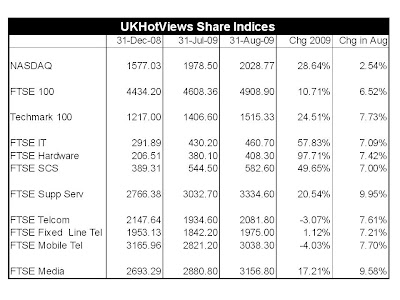 (By Richard Holway 3.00pm Monday 31st Aug 09) I was a bit surprised to see the Sunday Telegraph carrying the headline BT ousts BT Services boss Royston Hoggarth. We had carried the news that Mark Quatermaine had been confirmed as President BT Global Services UK back in July.
(By Richard Holway 3.00pm Monday 31st Aug 09) I was a bit surprised to see the Sunday Telegraph carrying the headline BT ousts BT Services boss Royston Hoggarth. We had carried the news that Mark Quatermaine had been confirmed as President BT Global Services UK back in July.The Telegraph gave the impression that Hoggarth was in some way to blame for the problems at BT Global Services by lumping him in with Francois Barrault. But Hoggarth had joined just a year back – see our 2nd Sept 08 post – New appointment at BT Global Services. As far as I understood it, Hoggarth was hired by BT to integrate Global Services in the UK (previously split into Public Sector, Health, Finance and the rest) into one business entity, to bring in the operational discipline and controls required and to help bottom the issues on the major contracts. Indeed to assist BT to take the hard decisions required during a difficult stage. Maybe Hoggarth was a bit too critical? Maybe BT Global Services 'new' management, which had afterall had been around in BT throughout the years when the problems had gone unaddressed, were a bit sensitive about that? Certainly my own experience of BT was of great frustration getting anyone to accept positive criticism - let alone take any action as a result.
Hoggarth has pursued a ‘pluralist career’ since leaving C&W in 2004 – so I was always unsure if BT was a temporary assignment for him or a route to bigger things in BT. I suspect he would have welcomed a bigger role at BT if only the politics hadn't gotten in the way.
The Telegraph article also gives the impression that all of BT Global Services ills were in the UK. This is far from the case. Indeed, I've always understood the UK to be the profitable bit - which is more than can be said for International. Sure the NHS IT was a big part of the problem but many of the other problem contracts were in International.
In any event, I really don’t think the word ‘oust’ in the Telegraph headline is appropriate. And I certainly don’t think the blame for BT Global Services ills should be attributed to Hoggarth. It’s BT Group’s top management and the CEOs and senior management of BT Global Services from 2002 – 2008 that should shoulder that responsibility.
































.jpg)